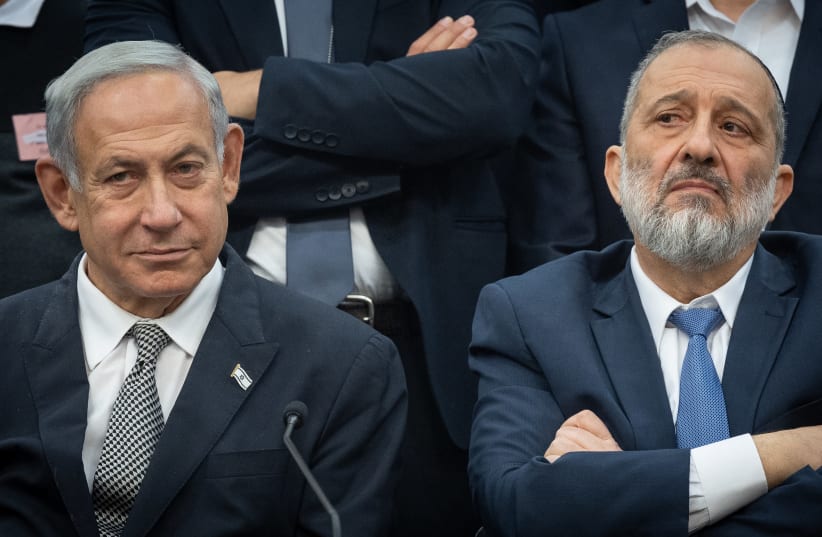On Wednesday, Prime Minister Benjamin Netanyahu and leaders of the haredi parties failed to come up with a new compromise on the controversial issue of the haredi exemption from IDF service that would enjoy legal backing from Attorney-General Gali Baharav-Miara.
The attempts at a new compromise were aimed at convincing the Supreme Court – ahead of a midnight deadline – to give the government a few more months to have the plan pass into law. The attorney-general is the government’s legal representative in the Supreme Court, and she requested that the court give her until 2:00 p.m. on Thursday to file the government's official response.
According to Israeli media outlets, a leaked draft of the response revealed that Baharav-Miara intends to claim that the state is no longer authorized to avoid recruiting yeshiva students, and should begin the process of drafting them from April 1 onwards. Regarding state funding to yeshivot, the A-G is expected to request that the funding cease but not immediately, so as to give the yeshivot time to adapt to the change.
The government’s proposal has been viewed as too weak because the haredim have refused to commit to specific quota numbers of draftees per year or to any financial or criminal sanctions for those who do not comply. Baharav-Miara said that without some minimal numbers and sanctions, it would be hopeless for her to try to defend the bill before the High Court of Justice.
It was expected that the government would ask for an additional postponement, given the inability to reach a deal to keep the government intact, with some reports suggesting a request for an additional 10 days. It was unlikely that the High Court would give the government much of a postponement, if any, and in the past, the High Court has often only granted a shorter extension than whatever the government had requested to keep up the pressure.
The court could also just let the issue play out at the hearing scheduled for Thursday and demand answers from the government throughout that hearing. In the most extreme case, the court could order an immediate universal draft until the government puts in place an alternative.
Fuchs blames attorney-general's office
Cabinet Secretary Yossi Fuchs wrote a letter to government ministers on Wednesday in which he blamed the Attorney-General’s Office for the government’s inability to pass a decision on time. Fuchs argued that the A-G’s office initially refused to support the decision for what it described as a “procedural” reason, namely that the decision did not include an opinion by the defense ministry. On March 24, however, the A-G’s office again refused on the same grounds, saying that the lack of a defense ministry opinion served as a “legal impediment.” Fuchs argued in the letter that the A-G’s office contradicted itself and had not made it clear in advance that the defense ministry opinion was legally obligatory. He added that the reason the defense ministry opinion was unattainable was because Defense Minister Yoav Gallant was not participating in the procedure.
“The door to the vault of government approval has been locked by the Attorney General’s Office and there is no key since, from a technical standpoint, it is impossible to receive the professional underpinnings from the defense ministry,” Fuchs wrote.
“Until this moment, the Attorney General’s Office has not pointed out any core problems or problems whatsoever in the government’s decision and has not raised a ‘black flag’ over it,” Fuchs accused.
Gallant refuted the claim that his ministry had not cooperated, saying in a written statement soon after Fuchs’s letter was published that the allegations were “biased and false.”
According to Gallant, “every request that was received regarding cooperation with the professional echelon in the defense ministry or a piece of data regarding the conscription law was approved and will continue to be approved.” However, the defense minister repeated a prior pledge that he would only support a bill that was supported by “the entire” emergency government, which includes Minister-without-Portolio Benny Gantz, head of the National Unity Party.
Opposition leader MK Yair Lapid said in response to Fuchs’s letter, “The government’s wonderful ability to evade any responsibility is impressive, and tonight, who is to blame that there is no conscription law? The attorney general? You got it wrong: The blame is on those who are attempting to whitewash draft-dodging and discriminate between groups based on blood.”
A source from United Torah Judaism expressed the party’s frustration with the prime minister.
“He [Netanyahu] signed an agreement. We wanted to pass [a new conscription bill] before the government’s formation; he delayed. We agreed [to pass the bill] before the budget [passed on May 23]; he delayed. If he wants a government, he must ensure that yeshiva students can study Torah,” the source told The Jerusalem Post in a text message.
Gantz also threatened earlier this week to leave the government if an unsatisfactory conscription bill passes into law.
In terms of viable alternatives and compromises that the government could adopt, there is a spectrum of ideas that other parties have presented, and there could also be variations on those proposals.
The closest way to a compromise would be some variation on Gantz’s proposal of all haredim having to do national service, with a more symbolic number serving in the IDF.
This would not truly address all of the IDF service inequalities that have angered the public for decades, but it would at least show the majority of the population that the haredim were ready to contribute to the national destiny in a physical and quantifiable way. (Haredim claim they care for the spiritual sustenance of the nation).
Also, if more Israelis from other sectors were being pulled out of necessary jobs, the haredim stepping in with national service would cover some of that gap.
Advocates of the Gantz compromise say it would temper some economic impacts and start a social transformation within the haredi community by connecting and contributing more to the nation.
In practice, IDF sources have said they cannot integrate all of the draft-eligible haredim and that it would probably take years to do so, if at all doable. They explained that there are too many social and educational issues to work through to take in haredim in anything other than gradual numbers.
Above a certain volume, it is not even clear that the IDF wants to spend the amount of resources necessary to integrate so many Haredim at once.
The lack of an agreement about how to solve the crisis is part of what has continued to allow the consistent rejectionist haredi position to prevail over the last several months, not to mention for decades before October 7.

